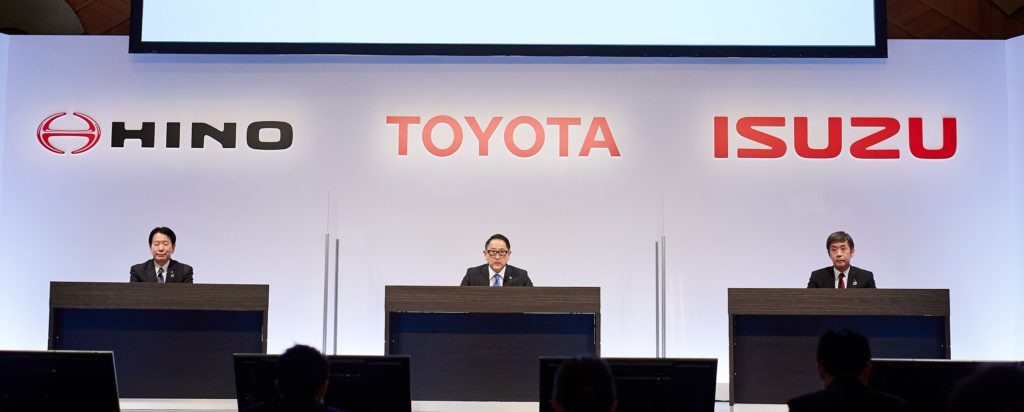Making the CASE for advanced commercial vehicles
24 March 2021

Advanced automotive systems including connected cars, autonomous driving, shared vehicles, and electromobility (CASE), are experiencing exponential development as OEMs undergo digitalisation. While many of these technologies might be associated with high-end luxury passenger cars, manufacturers are also exploring commercial vehicle applications.
Toyota Motor Corporation (Toyota) recently announced it would combine its CASE technologies with the commercial vehicle foundations cultivated by Isuzu Motors (Isuzu) and Hino Motors (Hino) as part of a new collaborative effort. Meanwhile, Renault’s light commercial vehicle (LCV) offering is undergoing its own energy transition, emphasising electric and hydrogen drivetrains for its upcoming models.
A commercial CASE
Through their new partnership, Toyota, Isuzu and Hino hope to accelerate the adoption and implementation of CASE technologies. As well as addressing various difficulties facing the transport industry, the three companies hope their collaboration will help the progression towards a carbon-neutral society.
In a press conference, the manufacturers explained small commercial-purpose trucks would be used to help develop battery electric vehicles (BEVs), electric platforms, and fuel-cell electric vehicles (FCEVs). Given the expensive developmental costs of BEVs and FCEVs, this collective approach makes sense. Toyota, Isuzu and Hino are also planning to advance the implementation of infrastructure. This will include introducing FCEV trucks to hydrogen-based society demonstrations in Japan’s Fukushima Prefecture.
The partnership will also look to accelerate the development of autonomous and other advanced systems. By building a connected technology platform for commercial vehicles, they hope to provide logistical solutions to improve transport efficiency as well as reducing CO2 emissions.
′CASE technologies can only contribute to society once they become widespread,’ the companies explained. ′Commercial vehicles can play important roles in dissemination, as they travel long distances for extended periods of time to support the economy and society and can be easily linked with infrastructure development. And from the standpoint of carbon neutrality, commercial vehicles can especially fulfil a key function.’
Forming new ties
To promote the partnership, the manufacturers will form a new business called Commercial Japan Partnership Technologies Corporation. This new company will be focused on mapping out CASE technologies and services for commercial vehicles. Moving forward, the collaboration will not only deepen, but open up to other like-minded partners.
Isuzu and Toyota have also agreed on a capital partnership to advance their collaborative efforts. Through a cancelation of treasury stock through a third-party allotment, Toyota is scheduled to acquire 39 million shares of its common stock worth a total of ¥42.8 billion (€332 million).
This will leave Toyota with 4.6% ownership of Isuzu in terms of total issued shares as of the end of September 2020 and a post-allotment voting rights ratio at Isuzu of 5.02%. Isuzu also plans to acquire Toyota shares of the same value through a market purchase.
Renault’s zero-emission solutions
Meanwhile, Renault is renewing and expanding its LCV range, with new versions of the Kangoo, the Express, the Trafic Combi and the SpaceClass. The manufacturer is also developing its Renault Pro+ services, offering turnkey digital and connectivity solutions.
Through this work Renault is looking to support the transmission to zero-emissions. The new Kangoo Van E-TECH Electric is expected by the end of 2021, picking up where the Kangoo ZE left off. It will be equipped with a 44kWh battery, offering a range of 265km. The OEM also offers fleet charging solutions with its subsidiary, Elexent.
Before the end of the year, Renault will unveil the Master ZE Hydrogen, an alternative to the diesel Master. With its hydrogen partner Plug Power, the manufacturer is looking to capture 30% of the European hydrogen LCV market by 2030.
Smart zero-emission vans promise greater development of green and connected technology for the wider automotive sector. Commercial vehicles spend their lives on the road, meaning any new drivetrain and technology must be well-designed and long-lasting. This know-how can then be utilised by the passenger-car segment, as these systems are stress-tested.
However, these technologies must first be adopted. As demonstrated by the European Automobile Manufacturer Association’s (ACEA’s) latest figures, diesel still reigned supreme last year in the new-LCV segment. Accounting for 92.4% of the van market, the fuel type was leagues ahead of electrically-chargeable vehicles (EVs) which garnered a 2% share. In reality, the adoption of these new drive trains will likely be mandated by zero-emissions policies created at national and international levels.